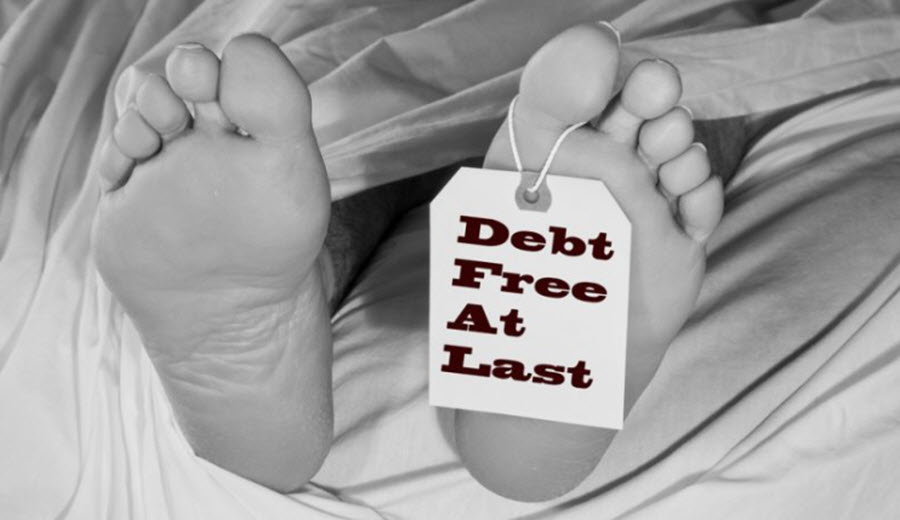Have you ever wondered what happens to your debt when you die? Do your student loans survive? What about your credit card debt?
You might think all your financial problems will die with you, but it’s possible your family could inherit some or all of your debt.
Understand how debt works to take control of your money now, so you can feel confident you’re leaving behind a legacy you can be proud of.
Who Is Responsible for Your Debt After Your Death?
It depends.
As a general rule, any debt that’s in your name only gets paid by your estate after you die. (Your estate is simply all the assets you owned at the time of your death—like bank accounts, cars, homes, possessions, etc.) The executor of your estate (a trusted person you appoint in your will) is in charge of making sure everything is taken care of: They’ll handle your assets, give your family their inheritance and pay off your debt, if necessary. This process is called probate.
But what happens if you have more debt than estate? Well, things get tricky.
Contrary to popular belief, debt doesn’t just disappear once a person passes on
Secured Debt vs. Unsecured Debt
Secured debt (such as mortgages, car loans, etc.) is backed by assets, which are typically sold or repossessed to pay back the lender. With unsecured debt (credit cards, personal loans, medical bills and utilities), the lender does not have that protection, and these bills generally go unpaid if there is no money to cover them.In the case of insolvent estates (those where the debt equals more than the value of assets), Insolvent Deceased Estates are dealt with by the law. These rules govern the order of payment to creditors. Payments for funeral, testamentary and administrative expenses are paid first. Any assets are then dealt with, but life insurance policies and superannuation benefits directly pass to the beneficiaries.
Credit Cards:
If there is a joint account holder associated with the credit card that person is liable for keeping up with the payments and paying off any debt associated with the card. If no one else’s name is listed on the account, the estate is responsible for paying off the card debt. If there is not enough money to cover the payments, the creditor may offer the next of kin a payment plan or the opportunity to write off the debt. If the debt exceeds $5,000, the executor, next of kin or creditor can bankrupt the estate.
Mortgages:
Home co-owners or inheritors are responsible for the remaining mortgage. If you are the sole borrower, the responsibility goes to the person you name as beneficiary. The bank has the right to request the payment of the loan in full from this beneficiary. They may choose to sell the house to pay off the loan.
Borrowers may have a guarantor loan, which enables people to enter the property market, purchase a property they could not afford or put down a bigger deposit and avoid paying lenders mortgage insurance. The guarantor offers up their property as security for your loan, and in the event of your death, the bank will expect the guarantor to cover the debt or difference between what the house sells for and what’s owed.
Mortgage Protection Insurance protects you and covers your mortgage repayments in the event of death, sickness, unemployment or disability.
Car Loans:
As with other secured debt, your assets can be used to cover car loans, but the lender has the ability to repossess the car if there’s not enough money in the estate. Otherwise, whoever inherits the car can continue making the payments or sell it to cover the loan.
Student Loans:
Under the current law, if a person does not pay off the money they owe to the Higher Education Loan Program before they die, the debt is wiped.
Can Loved Ones Inherit Your Debt?
When the time comes, you want to pass down that priceless wedding ring or the family farmhouse—not your money problems. As we’ve seen, most debt is taken out of the deceased person’s estate. But there are several instances that can make someone legally responsible for your debt after you die. Let’s take a look at them.
The Dangers of Cosigning
To put it simply, be very careful with cosigning. That’s because cosigning makes you liable for someone else’s debt. If you cosign for a friend’s loan, you are agreeing to make the payments if that person is no longer able to. And if they die, then they definitely aren’t able to make the payments, which leaves you responsible. Save yourself and your loved ones the financial stress — make sure everyone understands the responsibility of cosigning and have plans in place for any issues that may arise.
Timeshares
Banks don’t generally lend money to buy into timeshare schemes. You may be offered credit by a scheme operator or a credit provider associated with the scheme, and since most timeshare contracts include a “perpetuity clause,” the obligation to pay those maintenance fees can pass on to your heirs. And while beneficiaries can refuse the timeshare, timeshare companies can still come knocking because it’s technically part of the deceased’s estate and is subject to probate. Timeshares best suit people who want to make a long-term commitment to the accommodation, so if you’re hoping for an investment that will give you a financial return, you should get out while you still can.
What Can Creditors Take?
Not only does debt steal from you in the present, but it can also rob you of anything you were planning to pass down to your children or grandchildren.
Generally, the estate should be dealt with within 12 months of the deceased’s death. The executor of the estate may give a statutory notice, so if creditors don’t notify within six weeks of the notice, assets are distributed in accordance with the debts they’re aware of.
Some assets are protected from creditors. As a general rule, these include: money payable under a life insurance policy, superannuation death benefit payments and proceeds from a compensation claim.
Debt collectors aren’t much better than grave robbers. Even if you pass away, credit card companies still want their money, and they have no problem calling your grieving loved ones to try and get it. But unless they cosigned or are legally responsible for the amount owed, it is illegal for creditors to try to get money from a deceased person’s relatives. If you’re the family member getting these calls, you can tell those heartless creeps to buzz off! They do not have the power to demand you pay another person’s debt.
Why You Need Life Insurance
Even if your family isn’t officially liable for the debt you leave behind, having your estate eaten away by creditors can be just as traumatic. Do you really want your spouse or your kids to watch their home, cars and other possessions disappear while they’re in the middle of grieving your death?
Because life insurance is exempt from creditors, it basically guarantees that your spouse, children and whoever else you include as a beneficiary will get money after you die. Life cover, also known as term life insurance, pays a set amount of money when you die, which will go to the people you nominate as beneficiaries. Check whether you already have life insurance through your super, and make sure you understand what is and is not covered.
Life insurance can be a valuable asset in your estate if you have debts you wish to cover to protect your family’s future financial security. Your will can authorise your executor to use protected assets to pay off specific debts, so your life insurance proceeds could pay off the mortgage.
Debt Is Not a Death Sentence
All this talk of debt after death can be overwhelming. If you feel like you’re drowning in debt, you’re not alone. In 2018, one in six Australians struggled to pay off their debts, according to the Australian Securities and Investments Commission. Debt does not help you, but it also does not define you. It may seem like there is no way out, but there is hope!
No matter how deep in debt you are, it’s never too late to get help and turn your life around. You can be debt-free and change your family tree!
What Kind of Legacy Do You Want to Leave?
What if, instead of worrying about how your family would survive after you’re gone, you were able to rest in peace, knowing that they were well taken care of?
You want your loved ones to remember you for the blessing you were, not the burden you left behind. That’s why it’s important to think about your legacy, which includes proper planning and attacking debt.
Estate Planning
Half the battle of leaving a good legacy is making sure you legally prepare for what will happen with your finances after you die. Having a will makes the probate process so much easier on everyone involved, so go ahead and check that off your bucket list pronto. If you die without having a current will, the government will use a default will, appoint their own executor and divide your assets according to a process and formula.
Getting your affairs in order also means talking with your spouse and children about inheritance, and depending on the size of your estate, meeting with your lawyer. Yes, these kinds of conversations can be awkward and a little morbid, but they can save your family a lot of pain and stress later on.
Get Out of Debt
Ultimately, the best way to make sure your debt doesn’t affect your heirs is to not have any debt while you’re living. It’s tempting to postpone paying off your debt until you’re older, but as we know, debt often outlives the debtor.
More from Budgeting
Tackle Debt with the Right Solution!
Everyones debt is different, get proven relief strategies to determine what is right for you.
Tell us about your debt

See what you could save

Take control of debt






